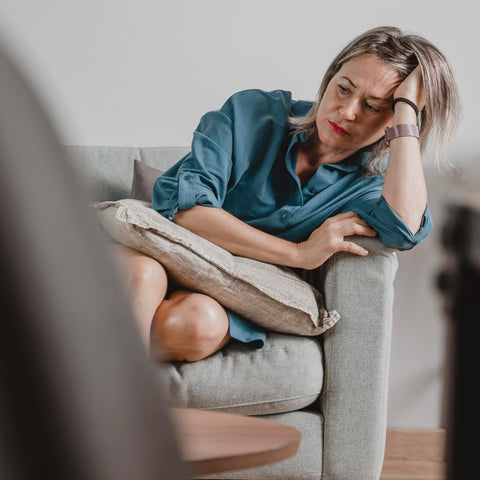Is there a gap in knowledge and understanding of menopause?
Despite increased public discussion about menopause in recent years, significant gaps in knowledge and understanding still persist.
In many cultures, menopause is still seen as something to be avoided or ignored. It's often viewed negatively, as it marks the end of fertility and youth. This societal stigma can discourage open conversations about the physical, emotional, and psychological impacts of menopause, leading to a lack of education and understanding.
A recent UK study found that younger women and marginalised communities report lower confidence and understanding of menopause-related issues.
For many years, medical research on menopause was underfunded or overlooked. As a result, there’s still a lack of standardised care and treatment approaches for managing menopause symptoms.
In Wales, a survey revealed that 30 % of participants had low knowledge of menopause, with younger people and men being the least informed. Only half of the participants believed lifestyle changes could help manage signs of menopause.
Many women feel unsupported in the workplace, with calls for better education for employers and healthcare professionals.
Can you explain what the menopause is, in terms of why the process occurs, and what happens in the body?
Menopause is a biological process that marks the end of a woman's reproductive years, signifying the cessation of menstruation and the ability to conceive. It typically occurs between the ages of 45 and 55, though it can happen earlier or later.
Menopause occurs because the ovaries gradually stop producing the hormones oestrogen and progesterone—the two key hormones that regulate the menstrual cycle and enable pregnancy.
There are different phases associated with menopause:
Perimenopause is the period leading up to menopause, typically starting in a woman's 40s but can start earlier. During this time, the ovaries begin to produce less oestrogen, and menstruation becomes irregular. This phase can last several years, with women experiencing fluctuating hormone levels.
Menopause is diagnosed when a woman has gone 12 consecutive months without a period. At this stage, the ovaries have stopped releasing eggs and producing oestrogen and progesterone in significant amounts.
Postmenopause is the period after menopause has been confirmed (after 12 months of no periods). While some menopausal symptoms may subside, others—such as vaginal dryness or a higher risk of osteoporosis—can continue due to the continued decline in oestrogen.

Adult woman stressing out at home | Free Photo
What are the most common symptoms?
The declining levels of female sex hormones during menopause may lead to the following symptoms: hot flushes, night sweats, fatigue, sleeplessness, difficulty concentration, mood swings, irritability, panic attacks, anxiety, feelings of sadness, depression, memory lapses or loss, lack of motivation, tension, heart palpitations, headaches, weight gain, muscle tension, joint pain, vaginal dryness, and loss of libido.
Hormonal changes related to menopause (and perimenopause) may also play a role in lung function decline (causing shortness of breath and other symptoms) since they can lead to systemic inflammation and the bone-thinning disease osteoporosis.
It is important to remember that the above listed symptoms are not always linked to the menopause. For example, nutritional deficiencies, low serotonin, deficiency of adrenal hormones, or low glucose levels (hypoglycaemia) can trigger many of the above symptoms.

Sad elder woman on the sofa | Free Photo
Do all women experience menopausal symptoms and should these symptoms be regarded as normal?
Interestingly, not all women experience some menopausal symptoms, and this variation is due to a combination of biological, lifestyle, cultural, and psychological factors. Also, the severity and duration of these symptoms vary from woman to woman.
Unpleasant menopausal symptoms are often regarded as the “normal” stage of life, but there are reasons to believe that they can be the result of years of nutritional deficiencies, unhealthy diet, chronic psychological stress, lack of regular physical activity and other elements of an unhealthy lifestyle.
Here's a breakdown of why some women may go through menopause with few or no noticeable symptoms:
Each woman’s hormonal health is unique. The rate and extent of oestrogen and progesterone decline during perimenopause and menopause can vary significantly.
Women who maintain an endocrine-friendly lifestyle—including a balanced diet, regular exercise, stress management, and avoiding smoking or alcohol—experience fewer symptoms.
In some cultures, menopause is viewed positively—as a transition to wisdom or freedom from fertility—which may psychologically reduce the severity of symptoms. Conversely, societies that stigmatise ageing or menopause may amplify symptom awareness due to stress or negative expectations.
Women with positive attitudes toward ageing and menopause often report fewer symptoms.
How much of a role do modifiable factors, such as our dietary choices and our lifestyle, play in our menopausal experience?
Hormonal imbalance before and during menopause can be exacerbated by many different factors such as lack of physical activity, environmental toxins, fear and negative attitude toward menopause, or chronic emotional stress.
However, the strongest negative influence on hormonal balance seems to be imposed by an unhealthy refined diet deprived of essential nutrients such as magnesium, zinc, B vitamins, vitamin E, and vitamin C that are required by the body to make hormones, including progesterone and oestrogen and maintain their balance.
It is believed that the key reason why in Asian countries (such as Japan, Korea or China), a much smaller percentage of women experience bad menopausal symptoms is that they do not share unhealthy Western diet and lifestyle habits.
Exercise has been shown to help reduce the frequency of panic attacks. It uses up any excess energy, promotes better sleep, helps with hormone regulation, and encourages good breathing techniques.
Getting adequate rest is crucial for the nervous system. If you do not sleep well, you are far more likely to suffer from anxiety and panic attacks.

Can you recommend a menopause-friendly way of eating?
Eating plant foods rich in fibre (vegetables, fruits, legumes, and grains) helps increase oestradiol levels. High dietary fibre intake was associated with higher oestradiol levels in a study on Latina women. Avocado and grapefruit were suggested to be the biggest contributors.
Consuming organic soya foods such as organic Tofu, Miso, etc. and 1 tablespoon of raw homemade sauerkraut (excellent source of probiotic bacteria required for the effectiveness of soya isoflavones) per day, seems to be the best food to safely increase oestrogen levels.
Avoid products with sugar and refined foods (white flour products and white rice) as they cause a deficiency of vitamin B1 (thiamine), B3 (niacin), B12, magnesium, zinc, and calcium, leading to nervousness, anxiety, fatigue, and irritability. Instead of sugar you may use erythritol, stevia, xylitol, raw organic honey, and other good sweeteners.
Eliminate caffeine and alcohol, as they can also have adverse effects on hormone levels. Caffeine dehydrates the adrenal glands, affecting cortisol levels, while sugar exhausts them. Caffeine and alcohol are likely to trigger panic attacks because they stimulate negative activity in the brain.
Do you recommend supplements? What would ideally be recommended?
Apart from good quality multivitamin-mineral supplements that contain all mentioned above nutrients, including magnesium, zinc, vitamin D3, B-complex, vitamin E and C, the following nutritional supplements and herbs can be offered by health stores and pharmacies to support women before and during menopause:
Soya isoflavones (daidzein and genistein) are famous for their safe oestrogen-regulating properties (although it may depend on one’s capacity to convert the isoflavone daidzein to equol that has greater oestrogenic activity than daidzein itself). In the past, trials studying the effects of these isoflavones on hot flushes and other menopause symptoms have given mixed results, but now a new meta-analysis combining data from 17 different studies provides strong support for their efficacy. The analysis revealed that an average intake of 54 milligrams per day of soy isoflavones for between six weeks and 12 months was associated with an average 21% reduction in the frequency of hot flushes, compared with placebo.
Isoflavones from soya can be significantly more effective in women whose colon is inhabited by probiotic bacteria able to convert soya isoflavones into equol (isoflavandiol metabolised from daidzein by bacterial flora in the intestines). For this reason, it is highly recommended to use soya isoflavones together with good probiotic formulas such as ColiProbio or UltraProbio.
Red clover contains isoflavones, which work as phytoestrogens, with possible benefits for menopause. It may help reduce cholesterol levels and protect against osteoporosis by reducing bone loss. Red clover may assist in the relief of menopausal symptoms as it is rich in phytonutrients and phytoestrogens, which are similar in shape to the female hormone called oestrogen.
In one study with 51 menopausal women Ashwagandha was very beneficial in helping body to normalise oestrogen and easy hot flashes, mood fluctuations, sleep issues, irritability and anxiety.
Maca is a plant that grows in central Peru, and it is traditionally used for female hormone imbalance, menstrual problems, tiredness, and signs of menopause and osteoporosis. Although maca doesn’t contain any hormones, yet it has a rare set of nutrients that nourish the endocrine system and may help support normal levels of oestrogen, progesterone, testosterone, or DHEA.
Studies have demonstrated benefits of Rhodiola in promoting hormonal balance by improving adrenal function. It also helps reduce fatigue and enhances mental function.
Evening primrose oil and Star flower oil supplements (both high in gamma linolenic acid) are known to have beneficial effect on hormonal balance, immune and nervous system. In 2013, the results of a randomized clinical trial which looked at the effects of evening primrose oil on 56 menopausal women (aged 45–59 years), was published. These women took two 500 milligram capsules of evening primrose oil or a placebo every day for a total of six weeks. The researchers then compared hot flashes between the two groups and found that oral evening primrose oil decreased the intensity of hot flash attacks and decreased the life disruption that results from these attacks.
MenoVital® is an original formulation that combines a balanced range of essential ingredients such as Vitamins, Minerals, Trace Elements, Amino Acids and Antioxidants, to provide nutritional support for women before, during and after menopause. It has also been fortified with high-quality natural plant extracts including Siberian Ginseng, Sage, Red Clover, Soy Isoflavones, Dong Quai, Flaxseed Oil, Starflower Oil and Liquorice.
Related Articles
Are Menopausal Symptoms Normal And How To Prevent And Cope With Them?
Sources
- https://www.youtube.com/watch?v=z7uATPC-7CY
- https://draxe.com/health/menopause-supplements-diet/
- womenshealth.gov/menopause
- nia.nih.gov/health/menopause
- med.stanford.edu/menopause
Any information or product suggested on this website is not intended to diagnose, treat, cure or prevent any medical condition. Never disregard medical advice or delay in seeking it because of something you have read on this website. Consult your primary healthcare physician before using any supplements or making any changes to your regime.






